高考虚拟语气用法归纳
- 格式:doc
- 大小:19.50 KB
- 文档页数:7
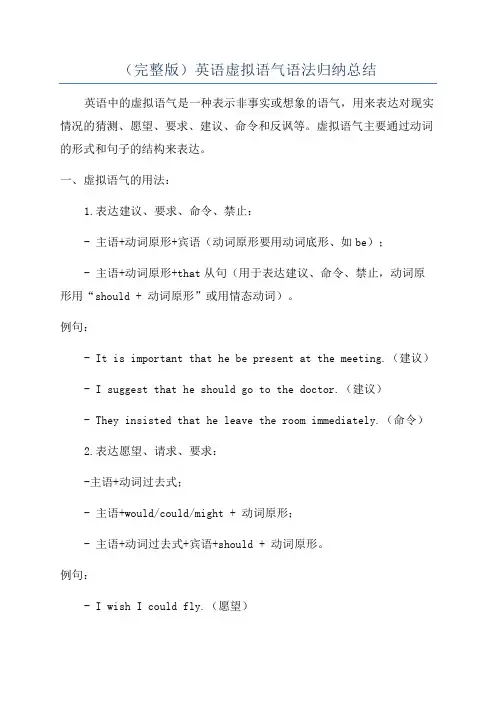
(完整版)英语虚拟语气语法归纳总结英语中的虚拟语气是一种表示非事实或想象的语气,用来表达对现实情况的猜测、愿望、要求、建议、命令和反讽等。
虚拟语气主要通过动词的形式和句子的结构来表达。
一、虚拟语气的用法:1.表达建议、要求、命令、禁止:- 主语+动词原形+宾语(动词原形要用动词底形、如be);- 主语+动词原形+that从句(用于表达建议、命令、禁止,动词原形用“should + 动词原形”或用情态动词)。
例句:- It is important that he be present at the meeting.(建议)- I suggest that he should go to the doctor.(建议)- They insisted that he leave the room immediately.(命令)2.表达愿望、请求、要求:-主语+动词过去式;- 主语+would/could/might + 动词原形;- 主语+动词过去式+宾语+should + 动词原形。
例句:- I wish I could fly.(愿望)- I would appreciate it if you could help me.(请求)3.表示虚拟条件:- If条件从句中的谓语动词用过去完成时,主句用would/should/might/could + have + 过去分词;- If条件从句中的谓语动词用过去时,主句用would/should/could + 动词原形。
例句:- If I had known his phone number, I would have called him.(虚拟条件)- If you had listened to me, we could have finished the project earlier.(虚拟条件)4.表达建议、要求、祝愿:- If only内部称述 + 主语 + 过去式。
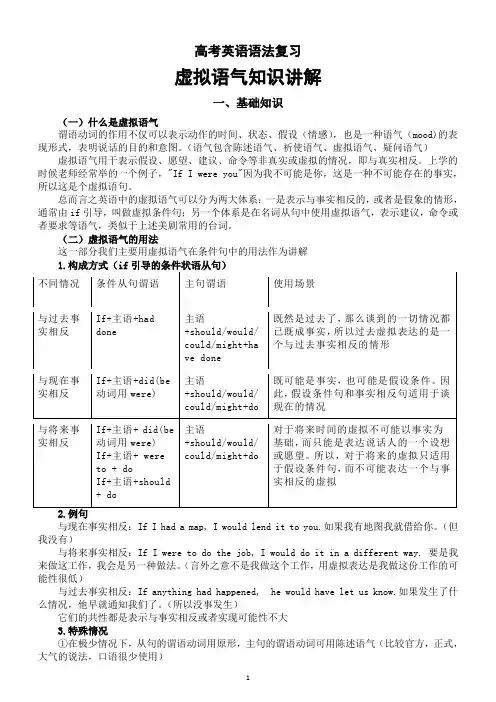
高考英语语法复习虚拟语气知识讲解一、基础知识(一)什么是虚拟语气谓语动词的作用不仅可以表示动作的时间、状态、假设(情感),也是一种语气(mood)的表现形式,表明说话的目的和意图。
(语气包含陈述语气、祈使语气、虚拟语气、疑问语气)虚拟语气用于表示假设、愿望、建议、命令等非真实或虚拟的情况,即与真实相反。
上学的时候老师经常举的一个例子,"If I were you"因为我不可能是你,这是一种不可能存在的事实,所以这是个虚拟语句。
总而言之英语中的虚拟语气可以分为两大体系:一是表示与事实相反的,或者是假象的情形,通常由if引导,叫做虚拟条件句;另一个体系是在名词从句中使用虚拟语气,表示建议,命令或者要求等语气,类似于上述美剧常用的台词。
(二)虚拟语气的用法这一部分我们主要用虚拟语气在条件句中的用法作为讲解与现在事实相反:If I had a map, I would lend it to you.如果我有地图我就借给你。
(但我没有)与将来事实相反:If I were to do the job, I would do it in a different way. 要是我来做这工作,我会是另一种做法。
(言外之意不是我做这个工作,用虚拟表达是我做这份工作的可能性很低)与过去事实相反:If anything had happened, he would have let us know.如果发生了什么情况,他早就通知我们了。
(所以没事发生)它们的共性都是表示与事实相反或者实现可能性不大3.特殊情况①在极少情况下,从句的谓语动词用原形,主句的谓语动词可用陈述语气(比较官方,正式,大气的说法,口语很少使用)If that be the official view, it cannot be accepted.如果这是官方的看法,这是不能接受的。
②if可以省略,但是语序要改为倒装Were I Tom I would refuse.如果我是汤姆我会拒绝。
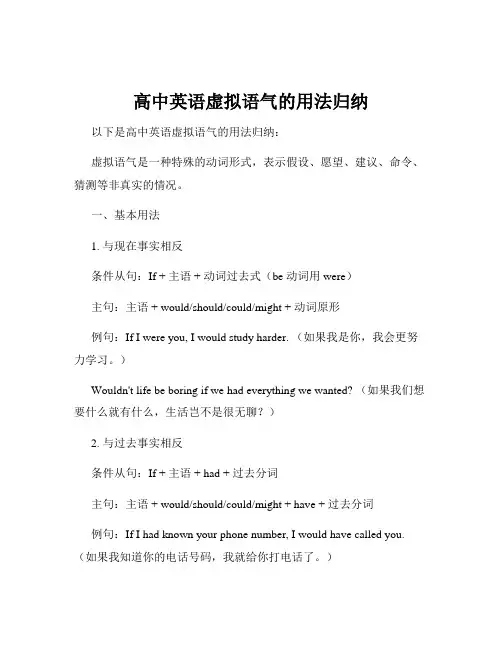
高中英语虚拟语气的用法归纳以下是高中英语虚拟语气的用法归纳:虚拟语气是一种特殊的动词形式,表示假设、愿望、建议、命令、猜测等非真实的情况。
一、基本用法1. 与现在事实相反条件从句:If + 主语 + 动词过去式(be 动词用 were)主句:主语 + would/should/could/might + 动词原形例句:If I were you, I would study harder. (如果我是你,我会更努力学习。
)Wouldn't life be boring if we had everything we wanted? (如果我们想要什么就有什么,生活岂不是很无聊?)2. 与过去事实相反条件从句:If + 主语 + had + 过去分词主句:主语 + would/should/could/might + have + 过去分词例句:If I had known your phone number, I would have called you. (如果我知道你的电话号码,我就给你打电话了。
)Couldn't you have done better if you had tried harder? (如果你再努力些,难道不能做得更好吗?)3. 与将来事实相反条件从句:① If + 主语 + 动词过去式② If + 主语 + were to + 动词原形③ If + 主语 + should + 动词原形主句:主语 + would/should/could/might + 动词原形例句:If it rained tomorrow, we would stay at home. (如果明天下雨,我们就待在家里。
)If she were to come here tomorrow, I would be very happy. (如果她明天来这儿,我会非常高兴。
)If he should fail in the exam, how disappointed his parents would be!(要是他考试不及格,他父母该多失望啊!)二、固定搭配1. wish 后的宾语从句与现在事实相反:从句用一般过去时与过去事实相反:从句用过去完成时与将来事实相反:从句用 would/could + 动词原形例句:I wish I were as tall as you. (我希望我和你一样高。
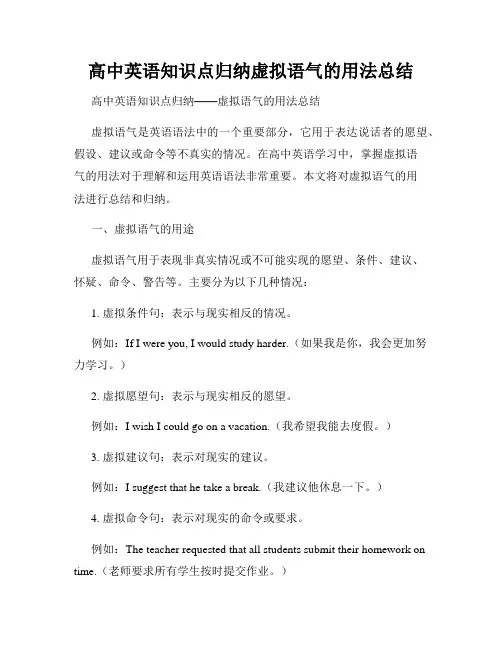
高中英语知识点归纳虚拟语气的用法总结高中英语知识点归纳——虚拟语气的用法总结虚拟语气是英语语法中的一个重要部分,它用于表达说话者的愿望、假设、建议或命令等不真实的情况。
在高中英语学习中,掌握虚拟语气的用法对于理解和运用英语语法非常重要。
本文将对虚拟语气的用法进行总结和归纳。
一、虚拟语气的用途虚拟语气用于表现非真实情况或不可能实现的愿望、条件、建议、怀疑、命令、警告等。
主要分为以下几种情况:1. 虚拟条件句:表示与现实相反的情况。
例如:If I were you, I would study harder.(如果我是你,我会更加努力学习。
)2. 虚拟愿望句:表示与现实相反的愿望。
例如:I wish I could go on a vacation.(我希望我能去度假。
)3. 虚拟建议句:表示对现实的建议。
例如:I suggest that he take a break.(我建议他休息一下。
)4. 虚拟命令句:表示对现实的命令或要求。
例如:The teacher requested that all students submit their homework on time.(老师要求所有学生按时提交作业。
)5. 虚拟警告句:表示对现实的警告或威胁。
例如:If you don't stop talking, I will call the police.(如果你不停止讲话,我会报警。
)二、虚拟语气的形式1. 虚拟语气在动词的形态上表现为过去式(一般过去时或过去完成时)。
例如:I suggested that he go to the library.(我建议他去图书馆。
)2. 虚拟语气在动词的形态上表现为"were"而不是"was"。
例如:If I were you, I would apologize.(如果我是你,我会道歉。
)3. 虚拟语气在情态动词的用法上表现为"should" + 动词原形。
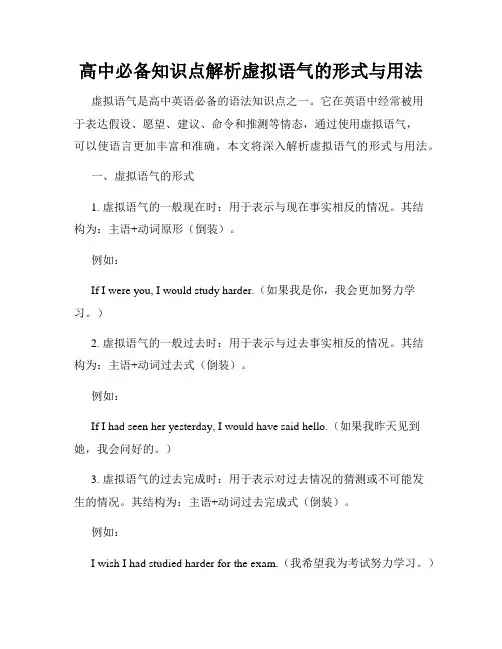
高中必备知识点解析虚拟语气的形式与用法虚拟语气是高中英语必备的语法知识点之一。
它在英语中经常被用于表达假设、愿望、建议、命令和推测等情态,通过使用虚拟语气,可以使语言更加丰富和准确。
本文将深入解析虚拟语气的形式与用法。
一、虚拟语气的形式1. 虚拟语气的一般现在时:用于表示与现在事实相反的情况。
其结构为:主语+动词原形(倒装)。
例如:If I were you, I would study harder.(如果我是你,我会更加努力学习。
)2. 虚拟语气的一般过去时:用于表示与过去事实相反的情况。
其结构为:主语+动词过去式(倒装)。
例如:If I had seen her yesterday, I would have said hello.(如果我昨天见到她,我会问好的。
)3. 虚拟语气的过去完成时:用于表示对过去情况的猜测或不可能发生的情况。
其结构为:主语+动词过去完成式(倒装)。
例如:I wish I had studied harder for the exam.(我希望我为考试努力学习。
)二、虚拟语气的用法1. 表达假设与条件:If I were you, I would travel around the world.(如果我是你,我会环游世界。
)I wish I had a million dollars.(我希望我有一百万美元。
)2. 表达愿望与建议:I wish you would stop smoking.(我希望你戒烟。
)It's important that she arrive on time.(她按时到达很重要。
)3. 表达命令与要求:The teacher ordered that the students be quiet.(老师要求学生们保持安静。
)She insisted that he leave immediately.(她坚持要他立刻离开。
)4. 表达推测与猜测:He looks as if he were sick.(他看起来像是生病了。
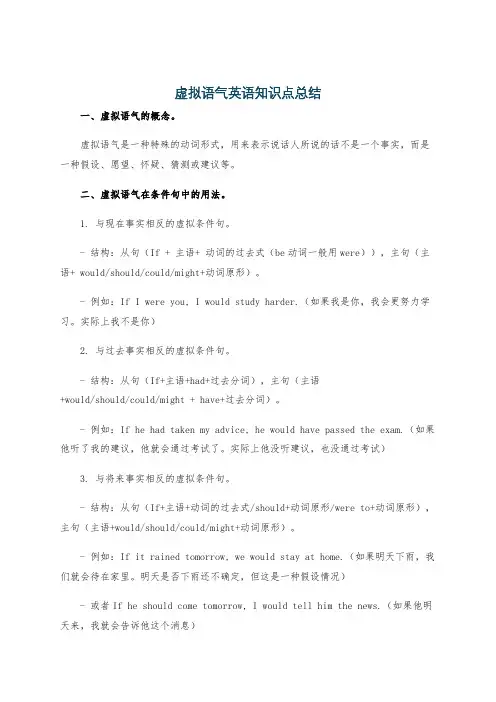
虚拟语气英语知识点总结一、虚拟语气的概念。
虚拟语气是一种特殊的动词形式,用来表示说话人所说的话不是一个事实,而是一种假设、愿望、怀疑、猜测或建议等。
二、虚拟语气在条件句中的用法。
1. 与现在事实相反的虚拟条件句。
- 结构:从句(If + 主语+ 动词的过去式(be动词一般用were)),主句(主语+ would/should/could/might+动词原形)。
- 例如:If I were you, I would study harder.(如果我是你,我会更努力学习。
实际上我不是你)2. 与过去事实相反的虚拟条件句。
- 结构:从句(If+主语+had+过去分词),主句(主语+would/should/could/might + have+过去分词)。
- 例如:If he had taken my advice, he would have passed the exam.(如果他听了我的建议,他就会通过考试了。
实际上他没听建议,也没通过考试)3. 与将来事实相反的虚拟条件句。
- 结构:从句(If+主语+动词的过去式/should+动词原形/were to+动词原形),主句(主语+would/should/could/might+动词原形)。
- 例如:If it rained tomorrow, we would stay at home.(如果明天下雨,我们就会待在家里。
明天是否下雨还不确定,但这是一种假设情况)- 或者If he should come tomorrow, I would tell him the news.(如果他明天来,我就会告诉他这个消息)- 以及If I were to see her tomorrow, I would give her the book.(如果我明天见到她,我就会把书给她)三、虚拟语气在宾语从句中的用法。
1. wish后的宾语从句。
- 表示与现在事实相反的愿望,从句谓语动词用过去式(be动词用were)。
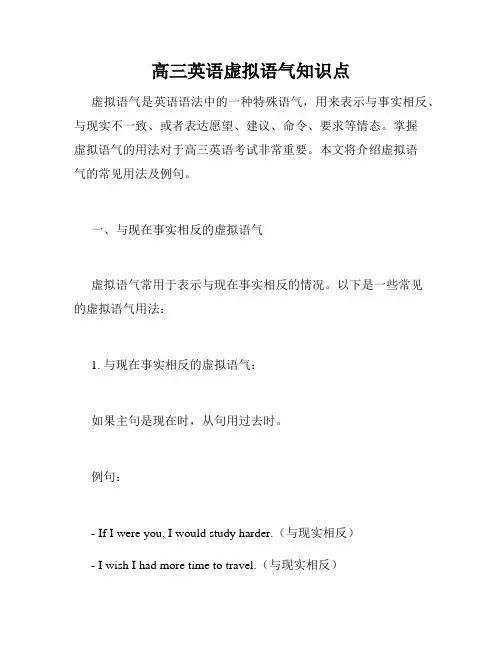
高三英语虚拟语气知识点虚拟语气是英语语法中的一种特殊语气,用来表示与事实相反、与现实不一致、或者表达愿望、建议、命令、要求等情态。
掌握虚拟语气的用法对于高三英语考试非常重要。
本文将介绍虚拟语气的常见用法及例句。
一、与现在事实相反的虚拟语气虚拟语气常用于表示与现在事实相反的情况。
以下是一些常见的虚拟语气用法:1. 与现在事实相反的虚拟语气:如果主句是现在时,从句用过去时。
例句:- If I were you, I would study harder.(与现实相反)- I wish I had more time to travel.(与现实相反)2. 表达建议、要求或命令等的虚拟语气:主句用“should”或“ought to”引导,从句用动词原形。
例句:- It is necessary that she should arrive on time.(建议)- He demanded that they leave immediately.(命令)二、与过去事实相反的虚拟语气虚拟语气还可以用来表示与过去事实相反的情况。
以下是一些常见的虚拟语气用法:1. 与过去事实相反的虚拟语气:如果主句是过去时,从句用过去完成时。
例句:- If he had studied harder, he would have passed the exam.(与过去事实相反)- I wish I hadn't eaten so much.(与过去事实相反)2. 表达愿望、建议或命令等的虚拟语气:主句用“should”或“ought to”引导,从句用动词原形或过去时。
例句:- It is high time that he applied for a job.(建议)- I wish he would stop talking.(愿望)三、与将来事实相反的虚拟语气虚拟语气还可以用来表示与将来事实相反的情况。
以下是一些常见的虚拟语气用法:1. 与将来事实相反的虚拟语气:如果主句是将来时,从句用过去完成时。
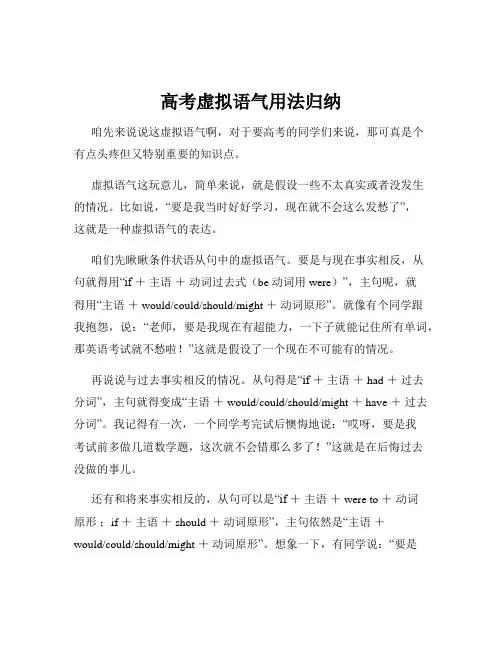
高考虚拟语气用法归纳咱先来说说这虚拟语气啊,对于要高考的同学们来说,那可真是个有点头疼但又特别重要的知识点。
虚拟语气这玩意儿,简单来说,就是假设一些不太真实或者没发生的情况。
比如说,“要是我当时好好学习,现在就不会这么发愁了”,这就是一种虚拟语气的表达。
咱们先瞅瞅条件状语从句中的虚拟语气。
要是与现在事实相反,从句就得用“if +主语+动词过去式(be 动词用 were)”,主句呢,就得用“主语+ would/could/should/might +动词原形”。
就像有个同学跟我抱怨,说:“老师,要是我现在有超能力,一下子就能记住所有单词,那英语考试就不愁啦!”这就是假设了一个现在不可能有的情况。
再说说与过去事实相反的情况。
从句得是“if +主语+ had +过去分词”,主句就得变成“主语+ would/could/should/might + have +过去分词”。
我记得有一次,一个同学考完试后懊悔地说:“哎呀,要是我考试前多做几道数学题,这次就不会错那么多了!”这就是在后悔过去没做的事儿。
还有和将来事实相反的,从句可以是“if +主语+ were to +动词原形;if +主语+ should +动词原形”,主句依然是“主语+would/could/should/might +动词原形”。
想象一下,有同学说:“要是明天世界末日,今天我就啥也不学,尽情玩!”虽然这事儿不太可能,但就是这种假设的虚拟语气。
虚拟语气在宾语从句里也有讲究。
比如说,wish 后的宾语从句,与现在事实相反用一般过去时;与过去事实相反用过去完成时;与将来事实相反用 would/could +动词原形。
我曾经听到一个同学许愿说:“真希望我现在是个学霸,啥题都会做!”这就是典型的与现在事实相反的虚拟语气表达。
还有在主语从句中,“It is +形容词(或过去分词)+that”结构中,如果形容词或过去分词表示“建议、要求、命令”等,从句的谓语动词要用“should +动词原形”,should 可以省略。
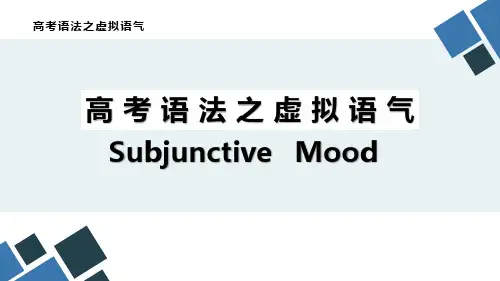
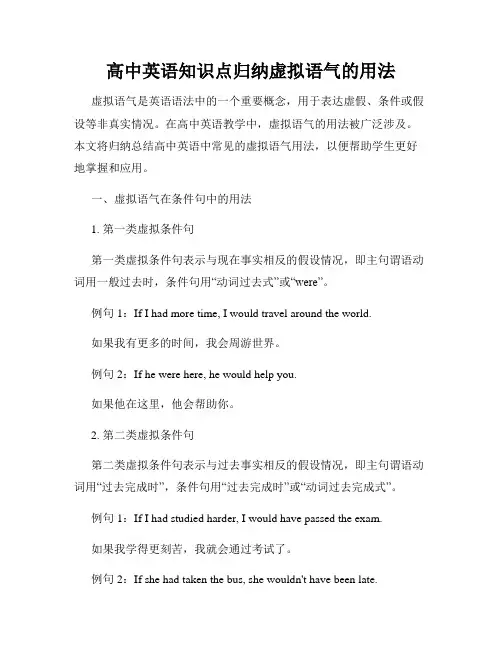
高中英语知识点归纳虚拟语气的用法虚拟语气是英语语法中的一个重要概念,用于表达虚假、条件或假设等非真实情况。
在高中英语教学中,虚拟语气的用法被广泛涉及。
本文将归纳总结高中英语中常见的虚拟语气用法,以便帮助学生更好地掌握和应用。
一、虚拟语气在条件句中的用法1. 第一类虚拟条件句第一类虚拟条件句表示与现在事实相反的假设情况,即主句谓语动词用一般过去时,条件句用“动词过去式”或“were”。
例句1:If I had more time, I would travel around the world.如果我有更多的时间,我会周游世界。
例句2:If he were here, he would help you.如果他在这里,他会帮助你。
2. 第二类虚拟条件句第二类虚拟条件句表示与过去事实相反的假设情况,即主句谓语动词用“过去完成时”,条件句用“过去完成时”或“动词过去完成式”。
例句1:If I had studied harder, I would have passed the exam.如果我学得更刻苦,我就会通过考试了。
例句2:If she had taken the bus, she wouldn't have been late.如果她坐公交车,她就不会迟到了。
二、虚拟语气在建议、命令和要求中的用法虚拟语气在建议、命令和要求中的用法是表示一种非真实或非直接的语气,用于表达对诉求对象的建议、命令或要求。
例句1:I suggest that he go to bed early.我建议他早点上床睡觉。
例句2:The teacher insisted that the students hand in their homework on time.老师坚持要求学生们按时交作业。
三、虚拟语气在感叹句中的用法虚拟语气在感叹句中的用法用于表达对现实情况的不满或对希望的夸大。
例句1:If only I were a bird and could fly freely in the sky!如果我是一只鸟,能自由地在天空中飞翔该多好啊!例句2:How I wish I had a magic wand to make all my dreams come true!我多希望我有一根魔法棒,让我的梦想都实现!四、虚拟语气在建立条件句中的用法虚拟语气在建立条件句中的用法用于建立一种假设条件,以进一步推断结果。
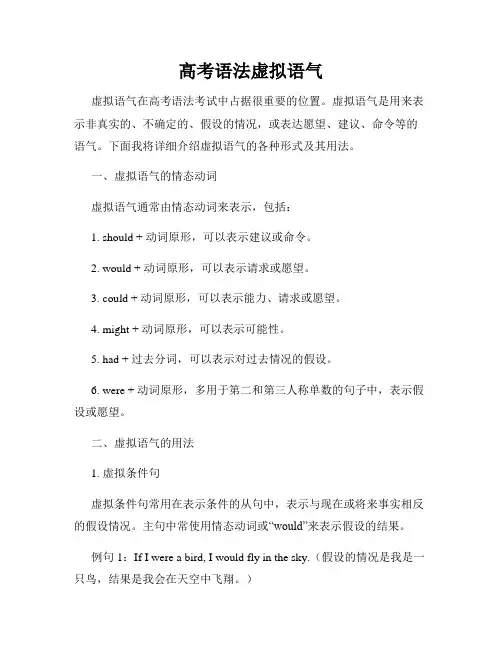
高考语法虚拟语气虚拟语气在高考语法考试中占据很重要的位置。
虚拟语气是用来表示非真实的、不确定的、假设的情况,或表达愿望、建议、命令等的语气。
下面我将详细介绍虚拟语气的各种形式及其用法。
一、虚拟语气的情态动词虚拟语气通常由情态动词来表示,包括:1. should + 动词原形,可以表示建议或命令。
2. would + 动词原形,可以表示请求或愿望。
3. could + 动词原形,可以表示能力、请求或愿望。
4. might + 动词原形,可以表示可能性。
5. had + 过去分词,可以表示对过去情况的假设。
6. were + 动词原形,多用于第二和第三人称单数的句子中,表示假设或愿望。
二、虚拟语气的用法1. 虚拟条件句虚拟条件句常用在表示条件的从句中,表示与现在或将来事实相反的假设情况。
主句中常使用情态动词或“would”来表示假设的结果。
例句1:If I were a bird, I would fly in the sky.(假设的情况是我是一只鸟,结果是我会在天空中飞翔。
)例句2:If you had studied harder, you would have passed the exam.(假设的情况是你学习更努力了,结果是你已经通过考试了。
)2. 虚拟语气用于表达命令、建议、要求、要求等虚拟语气还常用于表达命令、建议、要求等。
在这种情况下,常用“should + 动词原形”或“would + 动词原形”。
例句3:You should help your parents with the housework.(你应该帮助你的父母做家务。
)例句4:I wish you would listen to me.(我希望你能听我说。
)3. 虚拟语气用于表达愿望虚拟语气还常用于表达愿望,其中“would”是常见的情态动词。
例句5:I wish I could play the piano.(我希望我能弹钢琴。
高考英语中虚拟语气的用法和注意点是什么在高考英语中,虚拟语气是一个重要的语法点,也是让许多同学感到头疼的部分。
虚拟语气用于表达与事实相反、假设、愿望、建议等情况,它的用法多样,且有不少需要注意的地方。
接下来,咱们就详细地探讨一下高考英语中虚拟语气的用法和注意点。
一、虚拟语气在条件句中的用法1、与现在事实相反条件从句用一般过去时(be 动词用 were),主句用“would / could / should / might +动词原形”。
例如:If I were you, I would take the job (如果我是你,我会接受这份工作。
)2、与过去事实相反条件从句用过去完成时,主句用“would / could / should / might + have +过去分词”。
比如:If you had studied harder, you would have passed the exam (如果你学习更努力些,你就会通过考试了。
)3、与将来事实相反条件从句有三种形式:① should +动词原形;② were to +动词原形;③一般过去时。
主句用“wou ld / could / should / might +动词原形”。
举个例子:If it should rain tomorrow, we would stay at home (要是明天下雨,我们就待在家里。
)二、虚拟语气在宾语从句中的用法1、 wish 后的宾语从句表示与现在事实相反,用一般过去时;表示与过去事实相反,用过去完成时;表示与将来事实相反,用“would / could +动词原形”。
例如:I wish I were as tall as you (我希望我和你一样高。
)2、表示“建议、要求、命令”等动词后的宾语从句这类动词有suggest(建议)、advise(建议)、insist(坚持要求)、order(命令)、demand(要求)等,从句谓语用“should +动词原形”,should 可以省略。
虚拟语气用法总结大全一.虚拟语气在非真实条件句中二.虚拟语气在名词从句中1.在由suggest, demand, require, request, insist, order, command, propose等表示建议、请求、命令、愿望等动词或其同根词引出的名词从句中,名词从句虚拟句的谓语变化的形式只有一条规律——名词从句虚拟句无论其主句的谓语动词时何种形式,从句的谓语形式均为should+动词原形,其中should可以省三.虚拟语气的其他用法省一.虚拟语气在非真实条件句中1. — If the traffic hadn't been so heavy, I could have been back by 6 o'clock.—What a pity! Tina ______ here to see you. (2005 湖南)A. isB. wasC. would beD. has been2. It is hard for me to imagine what I would be doing today if I ______ in love, at the age of seven, with the Melinda Cox Library in my hometown. (2002 上海)A. wouldn't have fallenB. had not fallenC. should fallD. were to fall3. He hesitated(犹豫)for a moment before kicking the ball, otherwise he ______ a goal. (2001 上海春)A. had scoredB. scoredC. would scoreD. would have scored4. You didn't let me drive. If we _____in turn, you_____ so tired. (NMET96)A. drove; didn't getB. drove; wouldn't getC. were driving; wouldn't getD. had driven; wouldn't have got5. I didn't see your sister at the meeting. If she ______, she would have met my brother. (1994全国)A. has comeB. did comeC. cameD. had come6. -----If he__________, he __________that food.------Luckily he was sent to the hospital immediately. (MET93)A. was warned; would not takeB. had been warned; would not have takenC. would be warned; would not have takenD. would have been warned; had not taken7. If it_____ for the snow, we_____ the mountain yesterday. (MET91)A. were not; could have climbedB. were not; could climbC. had not been; could have climbedD. had not been; could climb8. Without electricity human life____ quite different today. (MET91)A. isB. will beC. would have beenD. would be11. --- Pity you missed the lecture on nuclear pollution.--- I it, but I was busy preparing for a job interview. (福建34’)A. attendedB. had attendedC. would attendD. would have attended12. I _______ through that bitter period without your generous help. ( 陕西22’)A. couldn’t have goneB. didn’t goC. wouldn’t goD. hadn’t gone13. I ______ sooner but I didn’t know that they we re waiting for me. (天津15’)A. had comeB. was comingC. would comeD. would have come14. I would have gone to visit him in the hospital had it been at all possible, but I fully occupied the whole of last week.A. wereB. had beenC. have beenD. was16. Had I known about this computer program, a huge amount time and energy .(2010浙江)A. would have been savedB. had been savedC. will be savedD. was saved17. ---- The weather has been very hot and dry.---- Yes. If it had rained even a drop, things would be much better now! And my vegetables .(2010北京)A. wouldn’t dieB. didn’t dieC. hadn’t diedD. wouldn’t have died18. If we the other road, we might have arrived here in time for the meeting. (2010湖南)A .followedB .should follow C. had followed D. would follow20. This printer is of good quality. If it _______ break down within the first year, we would repair it at our expense. (09天津15) A. would B. should C. could D. might 21. ------ Did you go to his wedding ceremony yesterday ? ------- No. But I would if I had been free. (改错) 二.虚拟语气在名词从句中1. — Where are the children? T he dinner’s going to be completely ruined.— I wish they always late. (北京28’)A. weren’tB. hadn’t beenC. wouldn’t beD. wouldn’t have been2. ______ in the regulations that you should not tell other people the password of your e-mail account. (05 上海)A. What is requiredB. What requiresC. It is requiredD. It requires3. —— Don't you think it necessary that he ______ to Miami but to New York?—— I agree, but the problem is ______ he has refused to. (2005 江苏)A. will not be sent; thatB. not be sent; thatC. should not be sent; whatD. should not send; what4.①The chairman suggested that the meeting _________________(put off) until the next week.②The look on his face suggested that he ____________(be) angry with what you did.5. Thank you for all your hard work last week. I don’t think we it without you. (08山东)A. can manageB. could have managedC. could manageD. can have managed6. The doctor recommended that you ____swim after eating a large meal.A. wouldn’tB. couldn’tC. needn’tD. shouldn’t (09浙江13)7.①The man in prison insisted that he _________nothing wrong and _________set free.A. had done, should beB. should do, should beC. had done, had beenD. should do, had b een②The patient insisted that he _________ill and _________to the hospital.A. wasn’t, wasn’t sentB. wasn’t, shouldn’t be sentC. shouldn’t be, wasn’t sentD. shouldn’t be, shouldn’t be se nt8.The workers demanded that their wages ___by 20 percent.A. raisedB. raiseC. should have been raisedD. be raised9. At the meeting everybody was against his suggestion that a new bridge ___over the river.A. be builtB. must be builtC. was to be builtD. had to be built10. It is politely requested by the hotel manager that radios ___after 11 o’clock at night.A. were not playedB. not be playedC. not to playD. did not play11. It is essential(必要的,重要的) that the books you borrowed from the library ___back before thedeadline(截止日期).A. be sentB. would be sentC. were sentD. must be sent三.虚拟语气的其他用法1. Look at the terrible situation I am in! If only I ___your advice.A. followB. had followedC. would followD. have followed2. Without the air to hold some of the sun's heat, the earth at night ______, too cold for us to live. (97 上海)A. would be freezing coldB. will be freezing coldlyC. would be frozen coldD. can freeze coldly3. It is necessary ___the dictionary immediately.A. that he will returnB. that he returnedC. that he returnD. that he has to return4. It’s already five o’clock now. Do you think it’s about time ___?A. we are going homeB. we go homeC. we went homeD. we can go home5. It ‘s high time you ___that you are not the most important person in the worldA. realizedB. have realizedC. realizeD. should be realizing6. You don’t have to be in such a hurry. I would rather you ___on business first.A. would goB. will goC. wentD. have gone7. George is going to talk about the geography of his country, but I’d rather he more on its culture.A .focus B. focused C. would focus D. had focused(2010江苏)8. I have watched that movie——it’ll give me horrible dreams.A. shouldn’tB. needn’tC. couldn’tD. mustn’t (2010山东)9. But for their help, we ___ the program in time. (09安徽34)A. can not finishB. will not finishC. had not finishedD. could not have finished10. But for the help of my English teacher, I ____ the first prize in the English Writing Competition.A. would not winB. would not have wonC. would winD. would have won (09福建35)11. What a pity? Considering his ability and experience, he better. (08江西)A. need have doneB. must have doneC. can have doneD. might have done12. If it were not for the fact that she _____ sing, I would invite her to the party. (2006 福建)A. couldn’tB. couldC. can’tD. might not13. ______ fired, your health care and other benefits would be immediately cut off.(2006 湖北)A. Would you beB. Should you beC. Could you beD. Might you be14. When a pencil is partly in a glass of water, it looks as if it ______. (1995 全国)A. breaksB. has brokenC. were brokenD. had been broken15. ______for the free tickets, I would not have gone to the films often. (1995 上海)A. If it is notB. Were it notC. Had it not beenD. If they were not16. What would have happened _________ , as far as the river bank? (NMET 2001 上海)A. Bob had walked fartherB. if Bob should walk fartherC. had Bob walked farther C. if Bob walked farther。
高考虚拟语气
高考虚拟语气是指在表达虚拟情况或假设的时候所使用的语气,与实际情况不符合。
下面是对高考虚拟语气的解释和用法:
在高考英语中,虚拟语气常常出现在条件句中,表示与事实相反的假设或不可能实现的愿望。
虚拟语气通常由动词的过去式(一般过去式、过去完成时)或“would”引导。
虚拟语气的用法主要有以下几种情况:
1. 虚拟条件句(If 条件句):
如果现在条件与事实相反,用虚拟语气表示。
例子:If I were you, I would study harder.(如果我是你,我会
更加努力学习。
)
在这个例句中,使用了虚拟语气“were”表示与现实相反的假设
情况。
2. 虚拟愿望句:
表示与现在事实相反的愿望,用虚拟语气表示。
例子:I wish I had studied harder for the exam.(我希望我当时
能更努力地学习考试。
)
这句话中使用了虚拟语气“had studied”表示与现实相反的假设
情况。
3. 虚拟建议句:
表示与现在事实相反的建议,用虚拟语气表示。
例子:I suggest that she go to the library to study.(我建议她去
图书馆学习。
)
这个例句中使用了虚拟语气“go”表示与现实相反的建议情况。
总之,高考虚拟语气在英语考试中常常出现,需要我们掌握相关的用法和规则,并能正确运用。
只有熟练掌握虚拟语气的使用方法,才能在高考中取得更好的成绩。
高中英语知识点归纳虚拟语气的运用虚拟语气是英语中一个重要的语法现象,它在日常交流和书面表达中经常被使用。
本文将对高中英语中虚拟语气的运用进行归纳总结。
一、条件句中的虚拟语气1. 类型1:对现在或将来的假设。
表达方式为"If + 主语 + 动词的过去式,主语 + would/should + 动词原形"。
这种虚拟语气用来表示与事实相反的假设情况。
例如:If I were rich, I would travel around the world.(如果我有钱,我会周游世界。
)2. 类型2:对现在或将来的不可能实现的愿望。
表达方式为"If + 主语 + 过去式,主语 + would/should + have + 过去分词"。
这种虚拟语气用来表示与现实相反的假设情况。
例如:If I had studied harder, I would have passed the exam.(如果我学得更用心些,我就能通过考试了。
)3. 类型3:对过去的虚拟情况。
表达方式为"If + 过去完成时,主语+ would/should + have + 过去分词"。
这种虚拟语气用来表示与过去事实相反的假设情况。
例如:If I hadn't missed the bus, I would have arrived on time.(如果我没有错过公交车,我就能准时到达。
)二、建议和要求中的虚拟语气1. "I wish/If only + 过去式"用来表达对现在或将来不可能实现的愿望。
例如:I wish I could speak fluent French.(我希望我能说一口流利的法语。
)2. "It's time + 主语 + 动词过去式"表示对现在或将来的建议。
例如:It's time you went to bed.(你该去睡觉了。
高中英语语法-虚拟语气全总结虚拟语气通常用于表达与现实相反的假设情况。
在非真实条件句中,虚拟语气的形式有两种:与现在事实相反的假设和与过去或将来事实相反的假设。
与现在事实相反的假设通常使用if+主语+助动词的过去式(如were。
did。
had)+动词原形,主句则使用XXX动词原形。
例如:If I had time。
I would XXX。
如果我有时间,我会参加会议。
与过去或将来事实相反的假设则有三种形式:①if+主语+动词过去式;②if+主语+wereto+动词原形;③if+主语+should+动词原形(注意不能是would)。
主句同样使用XXX动词原形。
例如:If you had taken my advice。
you would not have failed in the exam。
如果你听了我的建议,你就不会在考试中失败了。
在错综时间条件句中,动词形式要根据表示时间的状语从句作出相应的调整。
另外,在条件句中可以省略if,把were、had、should提到句首,变成倒装句式。
例如:Were I at school again。
I would study harder。
如果我还有上学的机会,我会更加努力研究。
Had you arrived earlier。
you would have caught the bus.If it rains tomorrow。
XXX climbing.What would you do with a n dollars?We couldn't have finished the work ahead of time without your help.Otherwise。
I would have taken part in the sports meeting.XXX me of your birthday。
or else I would have known nothing about it.A man who s drinking water would be dead in about seven days.I might have been XXX assistance。
虚拟语气如何用(1)对现在状况的虚拟对现在状况的虚拟,条件句中谓语动词用一般过去时,主句用“would/should/might/could+动词原形”。
(2)对过去状况的虚拟对过去状况的虚拟,条件句中谓语动词用过去完成时,主句用“would/should/might/could+have+过去分词”。
(3)对将来状况的虚拟对将来状况的虚拟,条件句中谓语动词可用should do, were to do或动词的过去式三种形式表示,但意义略有不同。
should表示的可能性比较大,动词过去式的可能性次之,were to do的可能性比较小。
主句谓语动词用“would/should/might/could+动词原形”。
(4)错综时间条件句有时条件从句谓语动词表示的动作和主句谓语表示的动作发生的时间不一致,这类句子称为错综时间条件句。
此时主从句动词的形式应通过各自所表示的时间开展调整。
If you had taken my advice then, you wouldn't be in trouble now.假如当时听我劝,你现在就不会有麻烦了。
(if条件句是对过去的虚拟,故用过去完成时,而主句是对现在的虚拟,故用“would+动词原形”形式。
)(5)表示“建议、命令、要求、坚决做”等动词后的宾语从句常用“(should+)动词原形(6)wish后的宾语从句wish后的宾语从句用一般过去时表示现在的状况,用过去完成时表示过去的状况,用would/could do表示将来的状况。
(7)would rather 后的宾语从句would rather后的从句常用一般过去时形式,表示现在或将来的状况;用过去完成时,表示过去的状况(8)It is/was important (necessary, appropriate, proper, right, essential, vital, etc.) that英语虚拟语气有什么用法一.定义: 动词虚拟语气表示说话人的愿望, 假设, 猜测, 建议, 请求, 意图, 设想等未能或不可能成为事实的状况, 或者在说话人看来实现可能性很小的状况, 而不表示客观存在的现实二.虚拟语气的表现形式: 根据句中谓语动词的特殊形式来表现. 这些特殊形式与谓语动词的某些时态相同, 但它们只表示语气, 而不表示时态, 但含有一定的时间定义虚拟语气的用法一.虚拟语气在简单句中的用法: 谓语动词用原形或may +动词原形1.表示祝愿a. Long live our country.b. May you succeed.c. May you be happy all your life.2.表示命令a. Everybody leave the room.二.虚拟语气在非真实条件句中的用法: (使用虚拟语气的含条件句的复合句称为真实条件句)1.表示与现在事实相反的状况时, if从句的谓语用动词的过去式(be动词的过去式多用were, 而不用was), 主句的谓语用should / would / could / might +动词原形(should多用于第一人称, would多用于二三人称, could / might可用于全部人称)a. If I had more time, I should study computer better.b. If he were not so busy, she would attend the meeting this afternoon.c. If they didn’t take exercises every day, they wouldn’t be so healthy.d. If you went to bed earlier, you would not be so sleepy in the morning.e. If she invited me, I should go to the party.2.表示与过去事实相反的状况时, if从句的谓语用had done形式, 主句的谓语用should / would / could / might + have done的形式a. If she had invited me yesterday, I should have gone to the party.b. I would have checked my paper again if I had had more time at yesterday’s exam.c. If you had taken the teacher’s advice, you would not have failed in the exam.3.表示与将来事实相反的状况时, if从句的谓语形式是: ①.完全动词过去式(be的过去式通常用were); ②.should +动词原形; ③.were to do. 其中②, ③种状况都含有出乎意料之外之意; 主句的谓语的形式是: should / would / could / might +动词原形a. If she should invite me tomorrow, I should go to the party.b. If it rained / should rain / were to rain tomorrow, our picnic would be put off.c. If I saw him tomorrow, I would pass your note to him.d. I might come back if I were to miss the train.三.虚拟语气在非真实条件句中用法的几个变体:1.条件从句省略if: 在书面语中, 假如条件从句中的谓语中有were, had, should等词, 可将if省略, 而把were, had, should放到句首a. Were I you (=If I were you ), I would get up early very early.b. Had you arrived (=If you had arrived ) at the station ten minutes earlier yesterday, you could have caught the train.2.省略条件从句或主句, 省略部分的含义仍有所体现. 省略主句时, 表示己不能实现的愿望a. You could have done it yourself (if you had wanted to).b. I wouldn’t smoke (if I were you).c. If my old friends were with me! (要是老朋友和我在一起该多好啊)d. If you could have seen the wonderful film!3.主从句时间不一致时, 主从句谓语动词的形式取决于要表示的详细时间a. You would speak English well if you had practised speaking it every day.b. If she hadn’t trained so hard, she wouldn’t be able to run so fast.4.假设的条件不以条件从句, 而以别的方式如介词短语、从句等表达出来, 这种句子称为含蓄条件句a. What would you do with a million dollars?b. Without music, the world would be a dull place.c. We could have done better with more money.d. He would have given you more help, but he has been so busy.四.虚拟语气在as if / though从句中的用法:1.表示与现在事实相反或对相在状况有所怀疑, as if / though从句谓语用过去式a. He speaks English so well as if she had studied English in England.b. She looked as if she were ill.2.表示与过去事实相反的状况, as if / though从句谓语用过去完成式a. The machines operated as if it had been repaired.五.虚拟语气在含even if / though从句的复合句中的用法:在此类复合句中, 若表示与事实相反, 可用虚拟语气形式. 主从句的谓语动词形式与非真实条件句相同a. Even if I were rich, I would work.六.虚拟语气在主语从句中的用法:假如表示说话人的看法, 想法或意见, 在句型It is / was + adj. + that从句中, 主语从句中可用虚拟语气. 主语从句中谓语动词用should do表示现在或将来状况, 用should have done表示过去状况a. It is necessary that you should clean the lab before you left.b. It is important that you should take the doctor’s advice.c. It was very strange that he should have left without say goodbye.七.虚拟语气在宾语从句中的用法:1.在wish的宾语从句中, 通常表示不可能实现或没有实现的愿望, 常用虚拟语气①.wish的宾语从句用过去式, 表示现在或将来没有实现或不可能实现的愿望a. I wish I knew the result of the match now.b. I wish it were spring here all the year round.c. I wish I could help you.d. I wish I were young.②.wish的宾语从句用过去完成式, 表示过去没有实现或不可能实现的愿望a. We wish we had got the film tickets last night.b. I wish you I had met him yesterday.③.wish的宾语从句若用would, 则一般表示请求, 对现状不满或期待未来有所改变a. I wish the prices would come down.b. I wish you would help me.c. I wish he would be more careful.d. We wish you would spend the holiday with us.2.在动词suggest (建议), advise (建议), demand (要求), require (要求), order (命令), insist (坚持)后的宾语从句中, 谓语动词常用( should )+动词原形的虚拟语气形式a. I suggested that we should go there at once.b. I demand that he should answer me at once.c. The doctor insisted that the patient should stay in bed for two weeks.d. The officer ordered that the soldiers should stop playing.与名词suggestion建议/ advice 建议/ demand要求/ request要求/ order 命令有关的从句(包括同位语从句和表语从句等)中的谓语也用( should ) +动词原形a. The black people made a strong demand that the government ( should ) take steps to change the unfair situation.b. Their demand is that the government should take steps to change the unfair situation.c. I was Bill’s suggestion that everybody should have a map.d. His suggestion was that everybody should have a map.八.虚拟语气用在句型: It is time that(该做某事了)中: that从句中的谓语动词用过去式a. It is time we got up.九.虚拟语气用在if only引导的感叹句中: 表示但愿, 要是就好了, 其中谓语形式与wish的宾语从句相同a. If only he didn’t drive so fast! ( =I wish he didn’t drive so fast.)b. If only he had taken the doctor’s advice. ( =I wish he had taken the doctor’s advice.)c. If only the rain would stop! ( =I wish the rain would stop.)十.虚拟语气用在would rather / prefer后的that从句中: 表示现在或将来状况谓语动词用过去时形式, 表示过去状况动词用过去完成时形式a. I would rather he came next Saturday.b. I would prefer you had seen the film yesterday.c. I would rather that he painted the house blue。
高考虚拟语气用法归纳在高三辅导学生备考过程中发现学生理解掌握和运用虑拟语气存在较大困难。
下面将结合学生及备考实际,对虚拟语气进行较全面的归纳,并配以适当的例句和练习。
一、帮助学生理解语气的涵义、种类、辨别各种不同的语气。
语气是动词的又一种形式,通过说话人所说的话体现出说话人对某一个动作或状态所持的态度和看法。
英语中有三种语气:1.陈述语气——用来陈述事实,广泛用于陈述句和疑问句中。
现行中学英语教材中,绝大部分句子均属陈述句语气,句中谓语动词有各种时态和语态变化。
2.祈使语气——用来提出请求、要求、发出命令等,只用于祈使句。
3.虚拟语气——用于表达一种假设情况、主观愿望、请求建议等,即所说内容与事实相反,或者实现的可能性极小,或者是假想虑拟的情况。
(练习)判断下列各句属于哪种语气。
①Onthewayup,Iambusytakingpictures.②Nike,fetchmesomenewspapers.③WhatifIwereyou?④Don’tforgettoturnoffthelight.⑤Healwaystakesh iswifeseriously.⑥IwishIwouldflytothemoon.Answers:①陈述语气。
②祈使语气③虚拟语气④祈使语气⑤陈述语气⑥虚拟语气二、理解虚拟语气在非真实条件句中的三种典型构成与用法,并能熟练运用条件句指主从复合句中的条件状语从句,分为真实条件句和非真实条件句两种。
真实条件句表示所叙述的内容是事实,或者完全可能成为现实,句子中的谓语动词用陈述语气;非真实条件句表示所叙述的内容与事实相反或实现的可能性极小,句子中的谓语动词用虚拟语气。
(练习)判断下列各句属于哪种条件句。
①Ifhedoesn’thurry,hemissthebus.②IfIwereyou,Iwouldaccepthisoffer.③IfIhavetime,Iwillcome.④Ifyouhadn’tcometohisschool,Iwouldn’thaveknownyou. Answers:①真实条件句②非真实条件句③真实条件句④非真实条件句下面讨论虚拟语气在非真实条件句中的三种构成和用法。
1.句子叙述的内容是对现在情况的假设,实际上不存在,或者说与现在的事实相反,其构成是:if从句…过去式(be用were)…;主句:…would+动词原形…should/could/might…例句:①Ifhisgrandmawerestillalive,shemightbeoverninety.②Ifnooneknewthismatter,howniceitwouldbe!③IfIwereyou,Iwouldrefusehim.④Ifmenhadwings,theywouldfly.(练习)用恰当的词完成句子。
①Ifyou_____alittlelonger,howniceit________!②Ifhe______here,everything______allright!③What_____you_____ifyou_____inhisshoes?④We_______muchbetterifwe______nopressure.Answers:①couldstay…wouldbe…②were…wouldbe…③would…do…were…④shouldfeel…had…2.句子所叙述的内容是对将来情况的假设,但在将来实现的可能性不大,或者与将来可能的事实相反,其构成是:if从句:…过去式(be用were)……wereto+动词原形…主句:…would+动词原形…should/could/might+动词原形……例句:①Ifyouhadbeenmorecareful,youwouldn’thavefailed.②Ifshehadtakenpartinthemorningexercises,shewouldn’thavebeensoweak.③IfIhadknownyournumber,Iwouldhaverangyouup.④Ifyouhadn’tdoneit,youwouldn’thaveregretted.三、认识两各种较复杂的条件句及if的省略问题。
1.错综时间条件句在以上三种情况中,主句与从句在时间上是一致的,即主、从句所叙述内容都与现在、过去或将来事实相反。
但有时主句与从句在时间上并不一致,即主句与过去事实相反,从句与现在实事相反,或者主句与现在事实相反,从句与过去事实相反,这种条件叫错综条件时间条件句。
主句和从句的谓语动词的虚拟语气要根据时间的不同来调整。
例句:①IwouldbeathomenowifIhadstartedearly.②Ifyouhadhadless,youwouldn’tbesofatnow.③Ifhehadtakenthedoctor’sadvice,hewouldn’tbesoseriousnow.④含蓄条件句假设的情况有时不是用条件句表示出来,而是隐含在一个介词短语中或者上下文中,或者在其它表达方式中,这种条件叫含蓄条件。
带有含蓄条件的句子或主从句也要按虚拟语气处理。
识别这类虚拟语气句的关键是能否快速准确地辨认出含蓄条件。
例句:①Withoutelectricity,therewouldbenomodernindustry.②Butforyourcooperation,wecouldnothavesucceededinourexp eriment.③Butthatshewasafraid,shewouldhavesaidno..3.非真实条件句中连词if的省略。
在正式文体中,if从句中的if可以省略,省略if后,从句必须倒装,即把were,should,had提到主语前面。
需要注意的是,如果有not,not不提前。
四、认识虚拟语气在某些从句及特殊句式中的使用1.用在表达要求、建议、命令或主张等动词、名词、形容词或-ed分词后的从句(宾语从句、主语从句、表语从句、同位语从句)中时,虚拟语气的构成是should+动词原形,should可能省略。
此种用法的关键是熟悉表示要求、建议、命令或主张等的词及其相互之间的转化。
例句:①HeinsistedthatJohn(shoul d)dothejob.②Itwassuggestedthatthemeeting(should)notbepostponed.③Hisoderthatmedicines(should)besenttherebyplanehascome attherighttime.④Itisnecessarythatyoushouldbepresentatthediscussion.注意:如果这些词表达的不是“要求、建议、命令主张”等意义而是其它词义,从句就不用虚拟语气,而要用陈述语气。
例:①H einsistedthatIwaswrong.②Theexpressiononherfacesuggestedthatsheknewthesecret.2.用在wish之后的英语从句中。
由于wish之后的英语从句表示愿望实现的可能性极小,或者与可能的事实相反,因此需要用虚拟语气,其构成用三种情况:若宾语从句的动作或状态与wish同时发生,用过去式(be用were),先于wish时,用had+过去分词,在wish 之后时,用would/could+动词原形。
这类句子中的wish可以理解为“希望”、“但愿”、“要是……就好了”。
例如:①IwishIwereasyoungasyou.②Howtheywisheditwerenotrainingthen.③Iwishthattherainwouldstop.(练习):用恰当的词完成句子。
①Iwishthathe_______badly_________.但愿他伤的不重。
②Wewishthatwe________time.希望我们没有浪费时间。
③IwishI______theaddress.要是我记得地址就好了。
Answers:①hadnotbeen……hurt②hadnotwasted③remembered3.用在wouldrather/wouldsooner后面的从句中,意思是“要是……就好了”\“宁愿”。
其构成取决于从句的内容与现在或将来事实相反,动词用过去式(be用were);与过去事实相反,动词用had+过去分词。
例句:①I’dratheryouweremygirlfriend.②I’dsooneryouwantthere.③I’dratheryouhadn’tdoneit.4、用在Itishigh/about)time后的从句中,动词用过去式,含有建议的意味。
例句:Itis(high)timethatwebegantowork.Itis(about)timethatchildrenwenttoschool.5.用在asif/though引导的状语从句或者表语从句中,此时从句所述内容与事实相反,或实现的可能性很小,其构成与wish后的宾语从句相同。
但如果可能性很大,还是要用陈述语气。
例句:shelovesthechildrenasiftheywereherown.Shelooksasifshewou ldcry.Itlooksasifitisgoingtorain.6.用在incase/lest/for/fearthat等引导的状语从句中,构成是should+动词原形,should不能省,这些状语从句也可以用陈述语气。
例句:Hetookhisraincoathimincaseitshouldrain. Sheputablanketoverthebabyforfearthatheshouldcatchcold.7、用在Ifonly等词引导的从句中,其构成与wish后的宾语从句相同。
例句:IfonlyIhadonemillion. Ifonlyhecouldcometomorrow.Ifonlyyouhadn’tdoneit.。